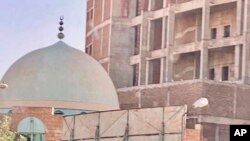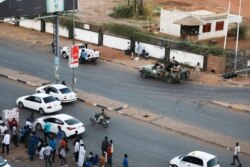Gunfire as heard again in the Sudanese capital Khartoum Tuesday, as a dispute between different factions of the country's armed forces laid bare the fragility of the country’s transition from military rule.
Transitional government spokesperson Faisal Mohamed Salih blamed the unrest on the National Intelligence and Security Service (NISS), a shadowy armed group that was loyal to former President Omar al-Bashir, who was overthrown in a coup last April following months of street protests.
NISS has been sidelined since the former president's overthrow, as Sudan's regular army and a paramilitary group called the Rapid Support Forces have become the country's most powerful armed groups. Both the army and the RSF are commanded by members of the ruling transitional government.
Salih said shooting took place in Kafuri neighborhood in Khartoum North, Soba area near the U.S. Embassy, and in Riyadh east of the airport. Another small protest by NISS members took place in El Obeid town in the country's Kordofan region, Salih said.
Reports said that the unrest began when soldiers being dismissed from NISS' Operations Division fired their weapons in the air in a dispute over payment of their severance. Many NISS soldiers have chosen to be dismissed with a severance as the country's armed forces restructure in the transition from military rule following Bashir's ouster.
Government officials say negotiations began to quell the unrest.
Sudanese journalist Sanosi Adam told VOA from Khartoum that soldiers blocked main roads and the city's airport briefly shut down operations during the shooting.
"My office is actually closer to the incident, so when I heard the gunfire, I cruised to the school to pick my kids, and on the way there were army vehicles with armed men wearing the Rapid Support Forces uniform responding toward the event, toward the gunfire," said Adam.
Adam said shooting restarted at about 10 p.m. in Kafuri in Khartoum North, and that the army through loudspeakers was asking people to vacate a nearby hospital and the area surrounding the NISS Operations Division headquarters.
Spokesman Salih said there were no casualties, but the Central Committee of Sudanese Doctors said four people had been wounded, including 15-year-old boy shot in the jaw and a soldier shot in the chest.
The shootings underscored the tensions between the country's various armed groups following the overthrow of longtime leader Bashir in April last year.
"The transitional government is still just starting to discover just how difficult this is," said Adam. "There are so many armies in Sudan, we have the reserves, and we have the national security, we have the Rapid Support Forces."
"This division, this operation division, has been there for a really long time. This division is equipped, it is experienced in war, and there's big numbers of them," Adam added. "The real question is why those soldiers who are being discharged are still in service or still holding guns? is this a power thing? do they have leverage over the army?"
Mohamed Hamdan Dagalo, who leads the RSF and is also a prominent member of Sudan's transitional government, accused former NISS chief Salah Ghosh of trying to stoke an insurrection.
Ghosh has not made any public comment on the allegations.
Dagalo, speaking from neighboring country South Sudan's capital Juba, also claimed that the current NISS chief ordered his troops to hand over their weapons to the ruling authorities.





